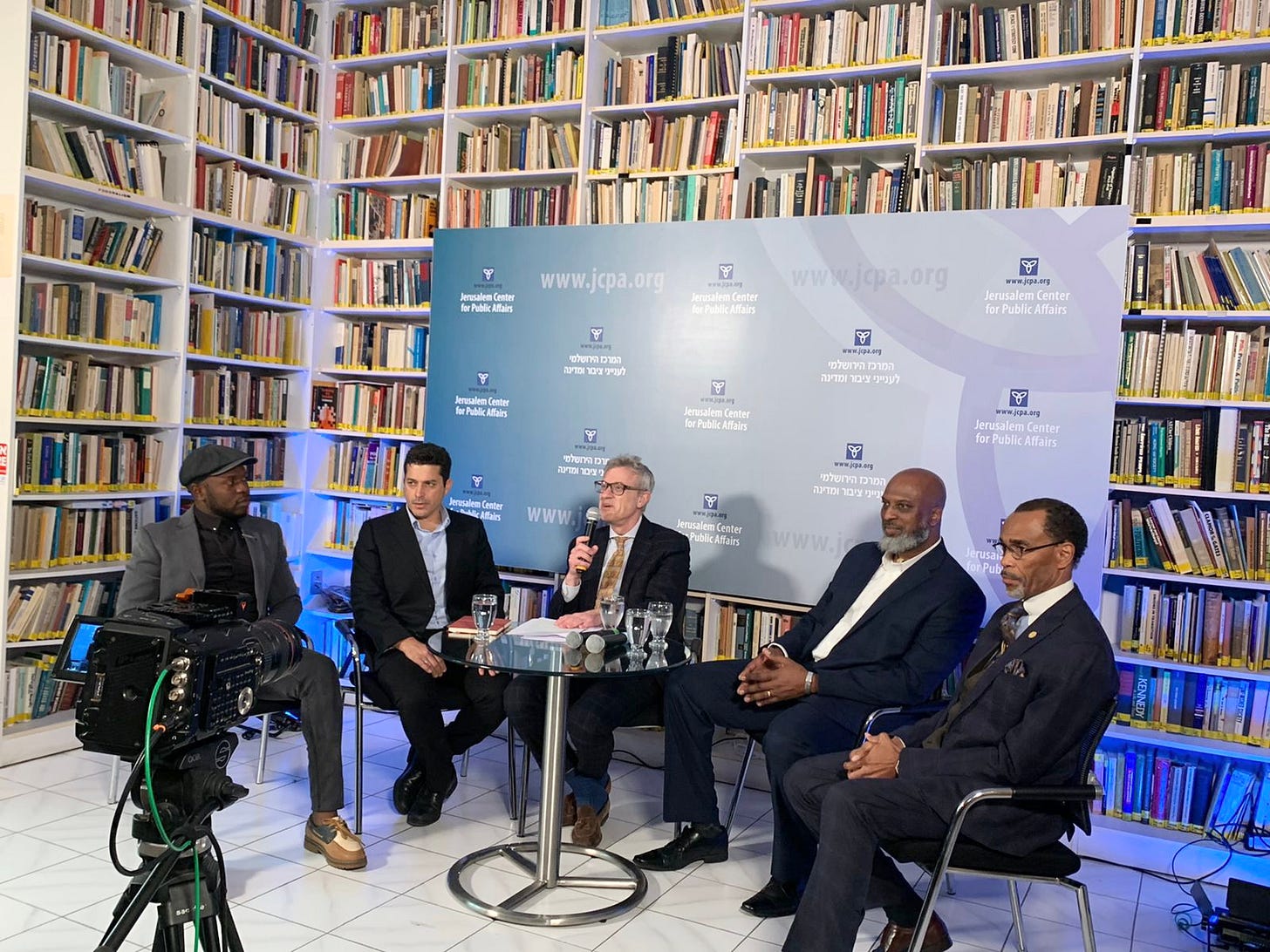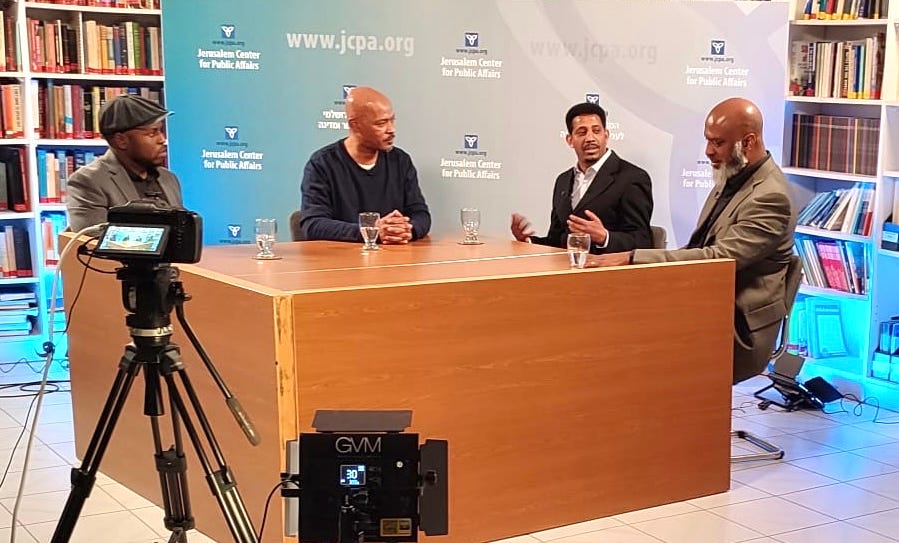IBSI in Jerusalem
Preparing for the JCPA Israel-Africa Security Conference - March 27-29

Since May 2020, the Institute for Black Solidarity with Israel (IBSI) and our partners at the Jerusalem Center for Public Affairs (JCPA) have coordinated Israel advocacy efforts that focus on the Black-Jewish, Africa-Israel connection. This began with the planning of the P.E.A.C.E./Promise Initiative which launched in September 2022 and saw our IBSI Ambassadors travel to South Africa in December. The IBSI Ambassadors will travel to Israel this June. The IBSI Pastors — Christian clergy version of the P.E.A.C.E. Initiative — will begin this fall.
For the past week, I have had the honor of being in Jerusalem hosted by Dan Diker and the JCPA creating video content that shows the rich cultural heritage and pluralism of the Jewish State and its people. We hosted panel discussions at the JCPA headquarters and conducted interviews in Palestinian-controlled Bethlehem. Our esteemed guests and colleagues included award-winning Arab Israeli journalist and JCPA Fellow Khaled Abu Toameh, Israeli journalist Rolene Marks, B’nei Israel (Jews of India) leader Eliaz Dandeker, Church of God in Christ Bishop of Israel Glenn Plummer, and Israeli Minister of Diaspora Affairs Amichai Chikli.
One of the panels discussed Black/African Zionism and the importance of the Africa-Israel relationship. It featured Africans for Peace Head Coordinator (and South African) Klaas Mokgomole, HR Logistics Coordinator for the Israeli Knesset Jonathan Takele, Eritrean refugee in Israel Habtom Mehari, and me. Jonathan Takele is an Ethiopian Jew who made aliyah (moved to Israel) in 1990. His relationships throughout both the Ethiopian Jewish as well as the Ethiopian Christian communities make him an invaluable resource. Habtom Mehari escaped Eritrea in 2008 and, miraculously, made it to Israel where he was rescued, attended university, and is now a businessman, husband, and father of three children. The four panelists — representing Africa and the African diaspora — spoke of the historical and contemporary importance of Israel as Christians, Jews, peace activists, and leaders in the Black/African communities.

March 27th-29th, JCPA will host the First Arab-Africa-Israel Security Conference.
The conference will focus on security, stability and cooperation, with roundtable discussions on the landmark 2020 Abraham Accords, anti-radicalism and counterinsurgency, as well as food and water security. It will also include two days of visits to cutting-edge Israeli tech companies.
It will include participants from Bahrain, Saudi Arabia, the UAE, Ethiopia, Uganda, Djibouti, Nigeria, Ghana, Kenya, Somalia, Sudan, Somaliland, South Sudan and South Africa.
Members of IBSI’s senior staff will attend JCPA’s Arab-Africa-Israel Security Conference and present to the international delegates in Jerusalem. These are all part of IBSI’s efforts to strengthen Africa-Israel/Black-Jewish ties and are a continuation of the legacy of Black American leaders’ connection to and concern for Africa and her diaspora. In 1889, President Benjamin Harrison appointed Frederick Douglass U.S. Minister Resident and Consul General to Haiti. Author Brandon Byrd explains that Douglass admitted that he took the post, “to represent the interests of the United States, and also with a view to advance the interests of…[a] peaceful, and orderly government of what is called ‘The Black Republic.’” In 1935, American fighter pilot, John C. Robinson was one of many Black men from Harlem who signed up to fight with Ethiopia against Mussolini’s invasion. In 1957, the Rev. Dr. Martin Luther King, Jr. and other Black American leaders attended the inauguration of Ghanaian Prime Minister, Kwame Nkrumah. In 1994, Black American leaders took then-President Bill Clinton to task for his inaction taken during the genocide in Rwanda.
Since the 1990s, one is hard-pressed to find examples of organized, Black American leadership on Africa. As the Palestinian narrative against Israel has gained preeminence in American academia and left-leaning political circles, Africa has lost its rightful place as a priority for the most powerful members of the African diaspora — Black Americans. For example, where has the Black voice been on the years-long war between the Tigray region and Ethiopia? Or on the Jihadist genocide of over 43,000 Christians and Igbo in Nigeria? Or on the 1 million African slaves in Libya (to say nothing of Mauritania or Sudan)? Or on the increased presence of Iranian-backed terrorism in Africa, giving Africa seven of the 10 highest risk countries, and the dubious distinction of being the eye of the global terrorism storm? When the false narrative of the Israeli-Palestinian conflict being among the world’s most pressing problems took hold, there was no room for Africa. This is one of the many tragedies of the deception of the anti-Israel Black Lives Matter organization. In choosing to side with Palestinian terrorists, BLM — with its world stage — has had nothing significant to say about the aforementioned issues in Nigeria, Ethiopia, Libya, or Sudan.
Through our partnership with the JCPA, IBSI seeks to engage African and Israeli leaders on what Black American leaders can do to help bring more peace and stability to the region. Just as the Abraham Accords are spreading peace and prosperity in the Middle East, a deepening of Africa-Israel ties will help bring peace and prosperity to Africa and her people. This is a new day, forged in the spirit of Ethiopian Queen Makeda’s visit to Jerusalem 3,000 years ago. And IBSI fully embraces the promises and challenges this moment brings.

